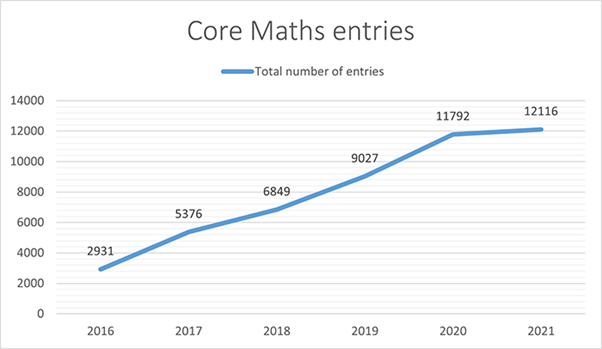Core Maths is an umbrella term for a specific type of maths qualification that has been defined by the government.
Core Maths is relatively new, but entries are growing rapidly, with over 12,000 entries in 2021.

Core Maths is intended for students who have passed GCSE Mathematics at grade 4 or better, but who have not chosen to study AS or A level Mathematics. It is usually studied alongside A levels or vocational courses. Core Maths is equal in size to an AS level qualification and graded A-E.
Studying Core Maths helps students develop their quantitative and problem-solving skills. It has been specifically designed with employers, universities and professional bodies to increase the employability of school leavers and apprentices.
If Core Maths would be useful preparation for a career in your industry, please consider making reference to it in your published recruitment criteria. If you have links with local schools and colleges, please also consider letting them know that you are aware of the benefits of Core Maths.
Core Maths qualifications
There are currently four different Core Maths qualifications; however, they don’t all include the words ‘Core Maths’ in their title, so it can be difficult to recognise them:
- AQA Level 3 Certificate Mathematical Studies
- Pearson Edexcel Level 3 Certificate in Mathematics in Context
- OCR Level 3 Certificate in Core Maths A (MEI)
- OCR Level 3 Certificate in Core Maths B (MEI)
They all focus on using and applying maths and include ideas and skills that support maths in other courses.
You may also see references to the following earlier versions of Core Maths qualifications:
- City & Guilds Level 3 Certificate in Using and Applying Mathematics
- City & Guilds Core Maths: Using and Applying Mathematics
- Eduqas Level 3 Mathematics for Work and Life (Core Maths)
- NCFE Level 3 Certificate in Mathematics for Everyday Life
- OCR Level 3 Certificate in Quantitative Reasoning (MEI)
- OCR Level 3 Certificate in Quantitative Problem Solving (MEI)
Core Maths content
All Core Maths qualifications include:
- interpreting solutions in the context of the problem
- understanding sources of error and bias when problem solving
- working with data
- understanding risk and probability
- understanding variation in statistics
- using exponential functions to model growth and decay
Most Core Maths qualifications also include:
- percentage change
- interpretation of graphs
- financial maths
- using standard units
- Fermi estimation
- the Normal distribution
- correlation, knowing it does not imply causation
- making and evaluating assumptions when modelling or problem solving
Further information is available in this Core Maths – Why it matters to employers leaflet.